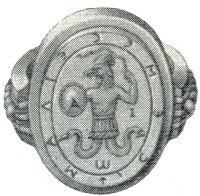These are the forgeries of jealousy:
and never, since the middle summer’s spring,
Met we on hill, in dale, forest or mead,
By paved fountain or by rushy brook,
Or in the beached margent of the sea,
To dance our ringlets to the whistling wind,
But with thy brawls thou hast disturb’d our sport.
Therefore the winds, piping to us in vain,
As in revenge, have suck’d up from the sea
Contagious fogs; which falling in the land
Have every pelting river made so proud
That they have overborne their continents:
The ox hath therefore stretch’d his yoke in vain,
The ploughman lost his sweat, and the green corn
Hath rotted ere his youth attain’d a beard;
The fold stands empty in the drowned field,
And crows are fatted with the murrion flock;
The nine men’s morris is fill’d up with mud,
And the quaint mazes in the wanton green
For lack of tread are undistinguishable:
The human mortals want their winter here;
No night is now with hymn or carol blest:
Therefore the moon, the governess of floods,
Pale in her anger, washes all the air,
That rheumatic diseases do abound:
And thorough this distemperature we see
The seasons alter: hoary-headed frosts
Far in the fresh lap of the crimson rose,
And on old Hiems’ thin and icy crown
An odorous chaplet of sweet summer buds
Is, as in mockery, set: the spring, the summer,
The childing autumn, angry winter, change
Their wonted liveries, and the mazed world,
By their increase, now knows not which is which:
And this same progeny of evils comes
From our debate, from our dissension;
We are their parents and original.
A recent Salon of The Western Mysteries reminded me that, most of the Western path is, drivel.
By drivel I mean exactly that. Stuck in Victorian largely attitudes or age of reason attitudes. Man controlling his own destiny. Man controlling nature. Man as superior to Woman. Money as. …A recent Farcebook Discussion reminded me I have little to nothing in common with most Western Practitioners.
Moving beyond a need for self improvement (that removes many ‘occult orders’), moving beyond gain (many see the Western path as a way to get stuff, be it Talismans, money magic etc)…
We find The Western path is about now, and what is now? It is crisis. It is about coming into harmony with the planet. This means putting down your special wands, put down the money spells.
For Christ commanded us to be Gardeners. This is why he was reborn in the garden.
One expression of this Garden is Faery and the very planet itself.
Magic then in the 21st century is not about self improvement, not about lodges, not about initiations, not about special tools, not about an order … …But it is bout Humanity, the planet and working within well established magical pathways to build bridges to the future.
I understand now, why most Occult groups for want of a better word are ‘lifeless.’ They are stuck in wish fulfillment, self improvement and thus largely Humanocentric thinking.
It is the 21st Century, the time is Now, our environment is crying…. It time to move away from stuffy lodges and dusty academia, throw away your talisman to avoid fungal warts…
It is a time for participation. It is a time to enable. It is a time to give. It is a time of compassion.
This is magic in the 21st Century.
Upon reflection I also see this as a call to arms for myself. To knuckle down with praxis.
This morning I entered the Inner Convocation, it was very liberating








